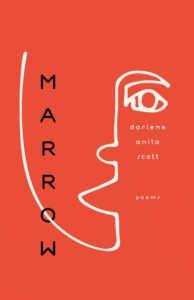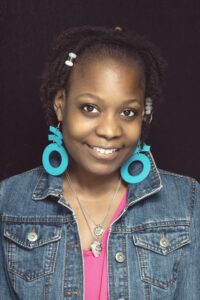 Book Title, Press, Year of Publication: Marrow, University Press of Kentucky, 2022
Book Title, Press, Year of Publication: Marrow, University Press of Kentucky, 2022
Synopsis: Marrow foregrounds and honors the people who have been disremembered; overlooked and overshadowed by the circumstances of their untimely loss in a mass murder-suicide at Jonestown, the Guyanese settlement of the Peoples Temple Agricultural Project—founded by James “Jim” Jones and popularly known as Jonestown—on November 18, 1978.
What do you think makes your book (or any book) a “project book”?
Lately I’ve been thinking that all books may be project books because they all have a unifying theme. But I’ve also noticed that the line gets drawn, for me, when the book is no longer personal and probably, but not always, requires some research that goes beyond—even when it starts in—the writer’s lived experience. So I guess I’m defining it in the reverse, like, by what makes a book not a project book.
Why this subject (or constraint)?
Marrow has a few intersecting origin stories. It began as a writing workshop assignment to research and write about a historical or cultural person, place, or event. I had a list—they were mostly images and headlines—that had played white noise to my childhood in the 80s. The other part of the origin story is that I chose the subject from my catalogue of images and headlines because the people I recalled seeing in the images were familiar. The people who I remembered on the covers of magazines we used to splay on the coffee table as decoration in those years looked like people I could know. And as an adult I wanted to know more about who they were and what had happened to arrive them, dead, in neatly stacked rows.
Are you comfortable with the term “project book”?
Yes, I mean, I’ve called all the activities to which I’ve committed a process “project.” And this book is certainly that. I have some art and poetry series—subjectively they’re related—but they’re not projects by my own definition because I don’t devote a process to them. They happen to circle the same mountain and I eventually arrive at some destination. They can and sometimes do evolve into a project if I circle the mountain enough times and I start devoting a process to the journey. And research. If I start researching them, oh, it’s on!
Was your project defined before you started writing? To what degree did it develop organically as you added poems?
It definitely worked itself out organically, and when I tried to get heavy-handed whether with form or subjects, it didn’t allow it. That feels like a very esoteric explanation. But it’s true, and I worked against imposing my opinions and ideas because I wanted to stay in that organic space; to let the voices of the people speak for themselves. I had an exercise where I would just scroll through and stare at photos like I was in a séance because I was trying so hard not to speak for or over the people I was writing.
Did you allow yourself to break your own rules?
In the “midterm” revisions I had to leave the organic space in which I had developed the collection and be a bit more deliberate in manipulating what had been written, in some cases adding and removing text to make sure the narrative arc was clear and representation of figures was as robust as I could make it. I wanted every perspective to get some page space to really round out the arc. (Every rereading tells me it’s not as round as I’d hoped!)
How important was it for you that each poem could “stand on its own” or that the poems should rely on other poems in the book, or on the premise of the project itself, to succeed? What challenges did this present for you when writing single poems or structuring the book overall?
It was important to me, but if I’m honest I’m not convinced that I succeeded at having these poems stand alone. When I create, I may have a story in mind that I think I’m telling. That’s mine. But the reading or viewing public’s story may be different, based on, say, what the color red means to them. So, I go for conveying feeling and whatever story gives you that feeling is The Story. So, here, I guess I let myself off the hook by deciding that if the reader feels at all—that the poem doesn’t need the whole collection’s arc to be successful. Nonetheless, when submitting the individual poems to journals, I always provided a synopsis of the full collection almost, probably, as insurance because I never could completely convince myself that my goal of evoking feeling was enough to make them stand alone.
At any point did you feel you were including (or were tempted to include) weaker poems in service of the project’s overall needs? This is a risk, and a common critique, of many project books. How did you deal with this?
I had to delete some poems because even though they fit the narrative arc they were weak on their own. And in some cases, those poems were recycled and fed into other poems. So they didn’t get trashed altogether. That part of the process is one of the reasons why I keep a file of the “giblets” and the offal because they can potentially add nuance and flavor or become something completely new and really good on their own. So, I think it’s really important to be willing to discard some things, but put them in the recycle bin, not in the trash.
Did you fully immerse yourself in writing this project book, or did you allow yourself to work on other things?
There is a great deal of heaviness in this subject, so working on other projects gave me necessary breaks. Once I was in the final revisions, before submitting it to publishers, I immersed myself in it, fully knowing the immersion was going to be temporary.
As a teacher, how do you see the prevalence of project books and other poetic constraints affecting your students’ writing?
Even though I think navel-gazing gets a bad rap—hah—I try to encourage many of my beginning writers who are hyper-personal and so committed to “this really happened in this exact way” to consider the possibilities of using that “this really happened in this exact way” in service to some other conversations. I like that project books can introduce students to possibilities for their writing that I don’t think they even imagine because they aren’t looking up, out, somewhere other than their navel. And then suddenly, after adopting the project framework, they’re even seeing their navels differently. So I think the project book has great instructional value.
After completing a project, how did you transition into writing something new? What are you working on now? Another project?
I’m working on a series of essays called Heal Is a Four Letter Word about obstacles to accessing wellness, especially inaccurate and incomplete messaging about what wellness is, and a poetry collection called Invitations Not to Be Denied exploring Black women’s experiences with desire. I was working on the poetry collection at the same time as Marrow so there wasn’t a formal transition, just toggling between tabs really.
What advice can you offer other writers, particularly emerging writers or poetry students who may be using the project book as a guiding principle for their own work?
I didn’t start this project thinking I would write a project book; I think I thought it would be a series and that would be about the sum of it. I’m glad that I tread lightly. I would advise the same for anyone pursuing the project framework for their writing. Basically, don’t be too heavy-handed or rigid in your process; let the project evolve organically. Be flexible and take your time—all advice that may well apply to any writing. I realize that this is all much easier said than done, but these are the best things I could’ve done. The worst of my writing happened when I was trying too hard.


